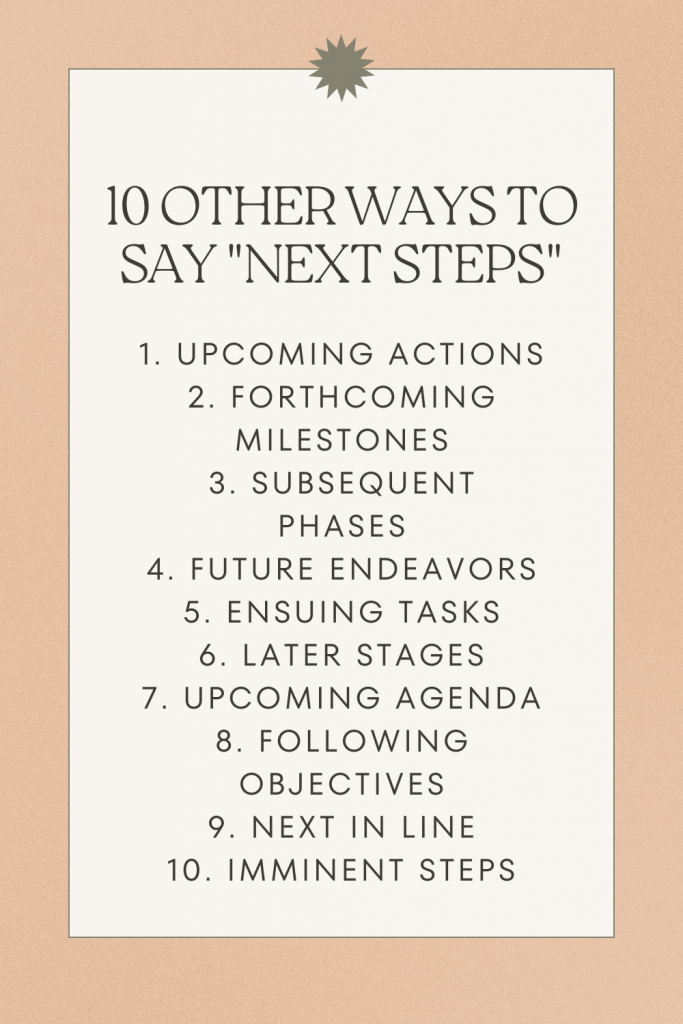When wrapping up a meeting, presentation, or project, you may often find yourself using the phrase “next steps” to outline upcoming actions or milestones.
There are also times when you may need to say “next steps” to your friends or colleagues to convey the next phases or actions in a more varied or creative way. This article will explore other ways to say “next steps” to diversify your vocabulary and make your communication more engaging.
Other Ways to Say Next Steps
Having a rich vocabulary allows you to formulate your thoughts more precisely. Instead of repeatedly using “next steps,” consider these alternatives based on context and your audience:
1. Upcoming Actions
Example: “Let’s discuss our upcoming actions for the project.”
Meaning: It refers to planned tasks or activities that are scheduled to take place in the near future. This term emphasizes the immediacy and readiness of these actions, suggesting that they are deliberate and on the horizon.
Usage: This term is versatile and can be used in both formal and informal settings, especially when discussing tasks or activities that are immediately next on the agenda.
2. Forthcoming Milestones
Example: “We have several forthcoming milestones to achieve before the end of the quarter.”
Meaning: Denotes significant events, achievements, or markers that are expected to occur in the near future. These milestones are often key points in a project or process, indicating major progress or completion.
Usage: Best suited for project management or business settings where there are clear markers of progress or achievement.
3. Subsequent Phases
Example: “After completing the initial research, we’ll move to the subsequent phases of development.”
Meaning: Refers to the stages or segments of a process that come after the current one. It emphasizes the sequential nature of a project or activity, emphasizing that it has a structured plan.
Usage: Ideal for projects or activities that have multiple stages or phases. It’s commonly used in research, development, or planning contexts.
4. Future Endeavors
Example: “Our team is excited about our future endeavors in the sustainability sector.”
Meaning: It hints at activities, ventures, or pursuits that one intends to undertake in the future. It is a broad term that encompasses both the spirit of ambition and the intention to progress.
Usage: This is a broader term and can be used in various contexts, from professional settings discussing future projects to personal contexts wishing someone well in their upcoming ventures.
5. Ensuing Tasks
Example: “We need to delegate the ensuing tasks to ensure timely completion.”
Meaning: Refers to tasks or responsibilities that follow the present. It emphasizes the continuity of work or the sequence in which tasks are organized.
Usage: Suitable for to-do lists, project management, or any context where there’s a sequence of tasks.
6. Later Stages
Example: “Once we finalize the design, we’ll proceed to the later stages of testing and implementation.”
Meaning: Refers to the segments of a process or activity that are set to occur after the preliminary or current stages. It implies a progression or evolution, indicating that the initial foundation has been laid and more advanced steps follow.
Usage: Commonly used in projects that have a clear progression or in discussions about growth, development, or evolution.
7. Upcoming Agenda
Example: “Our upcoming agenda includes a review of the feedback and adjustments based on it.”
Meaning: Indicates the list of topics, items, or discussions that are scheduled to be addressed or addressed soon. This gives a sense of structure and planning, indicating that there is a clear roadmap for upcoming discussions or activities.
Usage: Perfect for meetings or events where there’s a set list of topics to be covered.
8. Following Objectives
Example: “Our following objectives involve expanding our market reach and enhancing customer engagement.”
Meaning: Refers to the goals, objectives, or goals that are next in sequence after the current set. It emphasizes a forward-looking approach, suggesting that while current goals are important, there is always the next set of goals to achieve.
Usage: This term is apt for strategic planning, business meetings, or any context where there’s a clear set of goals.
9. Next in Line
Example: “What’s next in line for our marketing strategies?”
Meaning: Refers to the next object, task, or item in a predetermined sequence or order. It gives a sense of hierarchy or a systematic approach, ensuring that everything is considered in the specified order.
Usage: A versatile term, it can be used in a variety of contexts, from discussing tasks to talking about succession in a role or position.
10. Imminent Steps
Example: “Given the challenges, we need to strategize our imminent steps carefully.”
Meaning: Alludes to actions, decisions, or tasks that are about to happen or are expected to happen very soon. This term carries a sense of immediacy and urgency, suggesting that preparation is in place and execution is about to begin.
Usage: This term carries a sense of urgency and is suitable for situations where immediate actions or responses are required.

When to use different expressions
The synonym you choose for “next steps” should align with the context:
1. Formal Settings
In corporate meetings or official presentations, opt for terms like “forthcoming milestones” or “subsequent phases” to maintain a professional tone.
2. Casual Settings
In more relaxed environments, phrases like “what’s next in line” or “our future endeavors” can be more fitting.
3. Project Management
When discussing projects, “upcoming actions” or “ensuing tasks” can provide clarity on the tasks ahead.
4. Strategic Planning
For long-term planning, “later stages” or “following objectives” can give a broader view of the roadmap.
Conclusion
Effective communication, especially in a business context, depends on the richness and precision of vocabulary. By diversifying the ways we formulate future plans and actions, we not only improve clarity but also infuse our conversations with a sense of purpose and direction.
From “upcoming actions” that emphasize immediacy to “forthcoming milestones” that highlight key points of progress, each expression offers a unique nuance of meaning. In the fast-paced world of business, where every decision and action is critical, terms like “imminent steps” emphasize urgency, while “following objectives” keep the focus on forward momentum. To further hone your business communication skills and master the art of articulating plans and strategies, consider exploring resources such as Harvard Business Review’s Communication Articles. Their insights can provide valuable guidance for effective communication in the corporate world.
FAQs
1. Is “next steps” a correct phrase in English?
Yes, “next steps” is a standard phrase in English used to indicate subsequent actions or plans that will follow the current discussion or activity.
2. Is “next steps” too casual for official documents or corporate communication?
Not at all. “Next steps” is a neutral term that fits well in both casual and formal communication. However, depending on the tone and style of the document or communication, you might opt for synonyms like “subsequent phases” or “forthcoming actions” to add variety.
3. Can “next steps” be used in formal settings?
Absolutely! “Next steps” is a versatile phrase that can be used in both formal and informal contexts. In business meetings, presentations, or official documents, it’s a common term to indicate future actions or plans.









